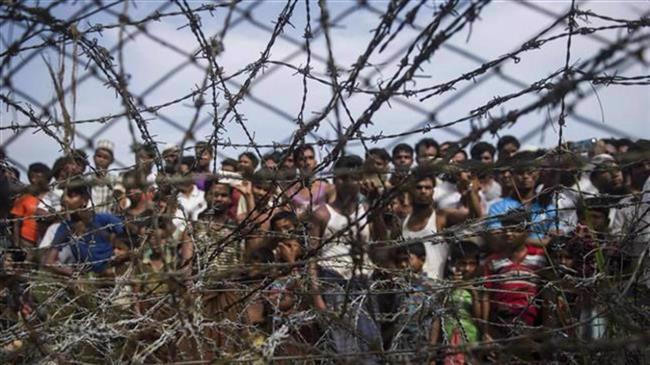Rohingya Muslim refugees living in ‘open prison’ in Myanmar: HRW
The Human Rights Watch (HRW) has denounced as an “open prison” the refugee camps housing tens of thousands of Rohyngia Muslims in Myanmar's western state of Rakhine and called for an immediate end to the mass detention of the ethnic minority.
The international rights organization said in a report on Thursday that approximately 130,000 Rohingya Muslims who remain in refugee camps in Rakhine state live under “squalid and abusive” conditions, urging that their “arbitrary and indefinite” detention be immediately ended.
“The Myanmar government has interned 130,000 Rohingya in inhuman conditions for eight years, cut off from their homes, land, and livelihoods, with little hope that things will improve,” said Shayna Bauchner, author of the report.
The 169-page report underlined that many Rohingya living in the refugee camps and camp-like communities experience “severe limitations” on their livelihoods and their movement.
The HRW said the living conditions in the camps had “increasingly threatened Rohingya’s right to life and other basic rights,” adding that the ethnic minority faces higher rates of malnutrition and other health problems.
The group urged the international community to exert more pressure on the government of Myanmar and hold officials accountable for the abuses.
The HRW said the report was based on more than 60 interviews with Rohingya Muslims as well as humanitarian workers that took place from late 2018.
Among the rights abuses recorded were the denial of freedom of movement such as the establishment of checkpoints and barbed-wire fencing around Rohingya camps and villages.
“Life in the camps is so painful” a Rohingya man was quoted as saying in the report. “There is no chance to move freely… We have nothing called freedom.”
The report said that the “sense of hopelessness in the camps” had become pervasive. Not even one Rohingya interviewed said they believed their indefinite detention would end soon.
Bauchner, the author of the report, called on Myanmar's de facto leader Aung San Suu Kyi and the military to take necessary steps to grant more freedom to the Rohingya who remain in the country.
“The government’s claims that it’s not committing the gravest international crimes will ring hollow until it cuts the barbed wire and allows Rohingya to return to their homes, with full legal protections,” she said.
More than 730,000 Rohingya Muslims fled Rakhine state to neighboring Bangladesh — joining more than 200,000 already there — amid a military-led crackdown in 2017 that the UN has said was perpetrated with “genocidal intent.”
Thousands were killed, and many others were raped, tortured, or arrested in the crackdown.
Myanmar's military flatly rejected the accusations, for which countless eyewitness testimonies and satellite image evidence were available.
UN High Commissioner for Human Rights Michelle Bachelet warned last month that Myanmar’s ongoing violence against the Rohingya “may constitute further war crimes or even crimes against humanity.”
Thousands of Rohingya Muslims remain in Myanmar, living under apartheid-like conditions, confined to camps and villages and denied access to healthcare and education.
The Rohingya have inhabited Rakhine for centuries, but the state denies them citizenship. Bangladesh refuses to grant them citizenship, too.
D-8’s role in Iran’s economy after Cairo summit
China slams US as ‘war-addicted’ threat to global security
China ‘firmly opposes’ US military aid to Taiwan
VIDEO | Press TV's News Headlines
President Yoon Suk Yeol to be removed from office
At least 19 Gazans killed by Israeli airstrikes since dawn: Medics
Leader: Iran neither has nor needs proxy forces
US fighter aircraft shot down ‘in friendly fire’ amid aggression on Yemen












 This makes it easy to access the Press TV website
This makes it easy to access the Press TV website